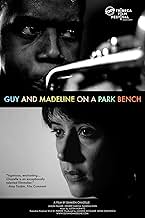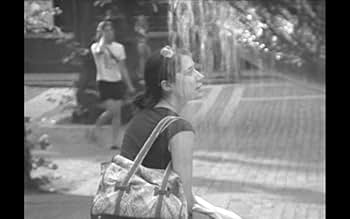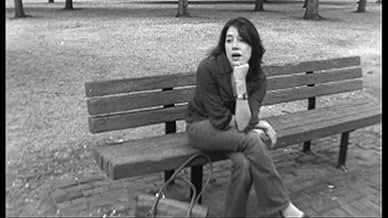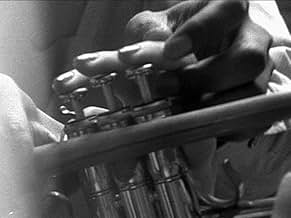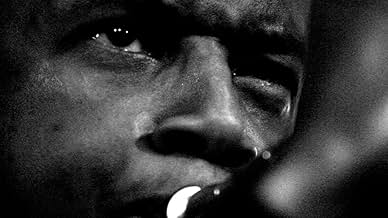Ajouter une intrigue dans votre langueAfter connecting with the shy Madeline, a jazz trumpeter embarks on a quest for a more gregarious paramour, but through a series of twists and turns punctuated by an original score, the two ... Tout lireAfter connecting with the shy Madeline, a jazz trumpeter embarks on a quest for a more gregarious paramour, but through a series of twists and turns punctuated by an original score, the two lovers seem destined to be together.After connecting with the shy Madeline, a jazz trumpeter embarks on a quest for a more gregarious paramour, but through a series of twists and turns punctuated by an original score, the two lovers seem destined to be together.
- Réalisation
- Scénario
- Casting principal
- Récompenses
- 2 victoires et 5 nominations au total
Avis à la une
Damien Chazelle's debut feels somewhere between a Jim Jarmusch indie and an Astaire-Roger musical. Here's a filmmaker with a deep love of the movie musical trying to make it work on a shoestring budget. The musical genre begs for rich production, so Chazelle tries to circumvent it with a nontraditional script; the central relationship is told in undefined fragments and almost exclusively in the less-sexy aftermath of their love. The musical elements are instead used as flourishes - sometimes daydreams, sometimes as breaks from the story. It's a mess, but one with its charms.
Chazelle's directorial strength is in detail shots and closeups that evoke a tenderness and the vulnerability of the characters. The film excels in these little character moments far more than it does in telling a complete story. Despite Chazelle's decision not to build the characters from the ground up, every so often he strikes a deeply familiar chord with just a few well-executed shots that it becomes possible to connect to Guy, Madeline and Elena's emotions.
The centerpiece of the film though is Justin Hurwitz's score, which feels timeless yet not overly cliche and predictable. The quality of the music, including what was presumably Jason Palmer's (Guy) own trumpet playing, puts the score in a class that the movie's visual quality can't keep up with to the point that you might assume Chazelle just purchased or borrowed professional music.
It's always nice to see how a now-esteemed director pulled together a project with minimal resources. Chazelle wanted to tell a love story that married jazz and musicals and he finds a way to do it, even if the finished project is rough around the edges and a little defiant of mainstream tastes.
Chazelle's directorial strength is in detail shots and closeups that evoke a tenderness and the vulnerability of the characters. The film excels in these little character moments far more than it does in telling a complete story. Despite Chazelle's decision not to build the characters from the ground up, every so often he strikes a deeply familiar chord with just a few well-executed shots that it becomes possible to connect to Guy, Madeline and Elena's emotions.
The centerpiece of the film though is Justin Hurwitz's score, which feels timeless yet not overly cliche and predictable. The quality of the music, including what was presumably Jason Palmer's (Guy) own trumpet playing, puts the score in a class that the movie's visual quality can't keep up with to the point that you might assume Chazelle just purchased or borrowed professional music.
It's always nice to see how a now-esteemed director pulled together a project with minimal resources. Chazelle wanted to tell a love story that married jazz and musicals and he finds a way to do it, even if the finished project is rough around the edges and a little defiant of mainstream tastes.
I definitely sought this out because of a particular reason- Damian Chazelle and Whiplash. Whiplash is an amazing film, intense, full of passion, and so I wanted to see his debut. It's a solid debut, if unremarkable and sort of dull at times. It's very natural and there's really nothing that would indicate the strong intensity in Whiplash. The only similarities are really that instruments and music are at the core (just like, also, the film he co-wrote grand Piano). Yeah, I could see many not liking this at all or liking Whiplash, or even, liking this or not Whiplash because both are so different in style so there's no telling which way the passion will go. I recommend it slightly, but it's not totally recommended and not a home run by any means
I thought the conceit of the film was to juxtapose a micro budget with a lush symphonic score and Godardish realism with tap dance numbers, but that never really happens. The musical numbers are few and far between, and the only real one (Boy in the Park) doesn't come until 3/4 of the way into the film.
If you establish a premise in a film (characters break into song to express their feelings), you must be true to it, not afraid of it. It felt like the filmmaker couldn't decide whether to go all the way - I wish he had. It would've made for a far more watchable film. What we get is a film that is unsatisfying for those watching for the fantasy and for those watching for the realism.
If you establish a premise in a film (characters break into song to express their feelings), you must be true to it, not afraid of it. It felt like the filmmaker couldn't decide whether to go all the way - I wish he had. It would've made for a far more watchable film. What we get is a film that is unsatisfying for those watching for the fantasy and for those watching for the realism.
There are so many similarities between this movie and the later La La Land: the perils of a relationship during times of rapid changing professional fortunes, the overall narrative tones, and the music score.
It is a fundamental movie to start the arc of Chazelle creativity, and while the obvious budgetary constraints are interfering with the narrative, there are many great shots and great Music.
Definitely recommended if watching movie is for you not exclusively entertainment but also part of an investigation of the true quality of the Art: expressing something fresh that can only be conveyed by potion pictures.
It is a fundamental movie to start the arc of Chazelle creativity, and while the obvious budgetary constraints are interfering with the narrative, there are many great shots and great Music.
Definitely recommended if watching movie is for you not exclusively entertainment but also part of an investigation of the true quality of the Art: expressing something fresh that can only be conveyed by potion pictures.
Damien Chazelle's feature film debut may not hold a candle to his subsequent films but it does showcase many of the themes & trademarks that he would go on to refine & perfect in his later works, especially the role of music in driving his narratives and his penchant for talented & ambitious protagonists. Not a memorable start by any means but a start nonetheless. And the creative leaps he's made since this film only speaks of his quick grasp & understanding of the filmmaking medium.
Le saviez-vous
- AnecdotesShortly after completing the film, a friend suggested to writer/director Damien Chazelle to watch Barry Jenkins's film Medicine for Melancholy (2008) given it was another black and white contemporary film gaining momentum among the indie circuit. Ironically, a friend of Barry Jenkins' told him to watch Guy and Madeline on a Park Bench (2009) shortly after completing his film. Both directors were up for several Academy Awards in 2017 for their films La La Land (2016) and Moonlight (2016) respectively and only discovered this after speaking to one another during The Hollywood Report's Oscar's Roundtable.
- GaffesWhen Guy and Elena meet on the train, a recorded announcement says "Entering Charles/MGH, Mass. General Hospital," but they are on a Green Line train, which doesn't go to Charles station.
- ConnexionsFeatured in Ebert Presents: At the Movies: Épisode #1.16 (2011)
Meilleurs choix
Connectez-vous pour évaluer et suivre la liste de favoris afin de recevoir des recommandations personnalisées
- How long is Guy and Madeline on a Park Bench?Alimenté par Alexa
Détails
Box-office
- Budget
- 60 000 $US (estimé)
- Montant brut aux États-Unis et au Canada
- 35 556 $US
- Week-end de sortie aux États-Unis et au Canada
- 3 233 $US
- 7 nov. 2010
- Montant brut mondial
- 35 556 $US
- Durée1 heure 22 minutes
- Couleur
- Rapport de forme
- 1.37 : 1
Contribuer à cette page
Suggérer une modification ou ajouter du contenu manquant

Lacune principale
By what name was Guy and Madeline on a Park Bench (2009) officially released in Canada in English?
Répondre


